-
ORIGINAL ARTICLE12-16-2024
Sleep quality of patients with heart failure and associated factors
Revista Brasileira de Enfermagem. 2024;77(6):e20240244
Abstract
ORIGINAL ARTICLESleep quality of patients with heart failure and associated factors
Revista Brasileira de Enfermagem. 2024;77(6):e20240244
DOI 10.1590/0034-7167-2024-0244
Views0See moreABSTRACT
Objectives:
to assess sleep quality of patients with heart failure and associated sociodemographic and clinical characteristics.
Methods:
a cross-sectional study, developed with 88 patients. Sleep quality was assessed by the Pittsburgh Sleep Quality Index. The data were analyzed using descriptive and inferential statistics.
Results:
the mean sleep quality score was 8.59 ± 3.60 points. 83% of participants were classified as poor sleepers. The number of hours of sleep was 5.99 ± 1.48. Family income of up to one minimum wage and functional class were significantly associated with poor sleepers. There was a positive correlation between functional class and poor sleep quality.
Conclusions:
a high frequency of poor sleepers was identified. Worse scores were associated with family income and symptomatic functional class. Health interventions are necessary to control sleep quality, especially in relation to health functionality.
-
ORIGINAL ARTICLE12-16-2024
Software for the care of people with cardiovascular risk: construction and evidence of validity
Revista Brasileira de Enfermagem. 2024;77(6):e20240276
Abstract
ORIGINAL ARTICLESoftware for the care of people with cardiovascular risk: construction and evidence of validity
Revista Brasileira de Enfermagem. 2024;77(6):e20240276
DOI 10.1590/0034-7167-2024-0276
Views0See moreABSTRACT
Objectives:
to build and validate software for the care of people with cardiovascular risk.
Methods:
a methodological study, applied to software development, anchored in a nursing theory and classification system, in three stages: 1) requirements engineering; 2) software architecture and coding; and 3) testing and content validity by 12 experts in computer science, with a Content Validity Ratio score.
Results:
called e-TEORISC, in software format, for nursing care for people with cardiovascular risk, online and offline, containing a database linked to the Nursing Process stages. Experts considered that the attributes of functional suitability, performance efficiency, reliability, maintainability, usability, safety and portability obtained desirable scores.
Conclusions:
e-TEORISC has evidence of validity to instrumentalize care for people at cardiovascular risk, with potential for technology transfer to the Brazilian Health System.

-
ORIGINAL ARTICLE12-16-2024
A relação entre gênero, formação educacional e ambiente de aprendizagem com a ansiedade do estudante de enfermagem
Revista Brasileira de Enfermagem. 2024;77(6):e20220615
Abstract
ORIGINAL ARTICLEA relação entre gênero, formação educacional e ambiente de aprendizagem com a ansiedade do estudante de enfermagem
Revista Brasileira de Enfermagem. 2024;77(6):e20220615
DOI 10.1590/0034-7167-2022-0615
Views0See moreRESUMEN
Objetivos:
identificar las variables asociadas a la práctica clínica relacionadas con la ansiedad de los estudiantes de enfermería.
Métodos:
se utilizó un diseño descriptivo, cuantitativo, correlacional con las recomendaciones STROBE, EQUATOR. La población fue de 233 estudiantes de enfermería con una muestra de 135 personas. Los datos se recopilaron de marzo a abril de 2022 utilizando instrumentos validados.
Resultados:
la prueba de chi-cuadrado y razón de verosimilitud significativa para género, formación académica y entorno de aprendizaje son superiores a 0.05, por lo que no existe una relación significativa entre las variables y la ansiedad de los estudiantes.
Conclusiones:
los estudiantes necesitan prepararse nuevamente antes de ingresar al campo de la práctica. Investigaciones cualitativas también son necesarias.
-
ORIGINAL ARTICLE12-13-2024
Stress in nursing workers caring for people with COVID-19
Revista Brasileira de Enfermagem. 2024;77(5):e20230542
Abstract
ORIGINAL ARTICLEStress in nursing workers caring for people with COVID-19
Revista Brasileira de Enfermagem. 2024;77(5):e20230542
DOI 10.1590/0034-7167-2023-0542
Views0See moreABSTRACT
Objectives:
to analyze stress from the perspective of nursing workers caring for people with COVID-19 in a public hospital in the Recôncavo region of Bahia.
Methods:
this is an exploratory qualitative study, conducted through semi-structured interviews. The data were analyzed using word clouds, similarity trees, and content analysis.
Results:
nursing workers were exposed to stress while attending to patients with COVID-19. The reported stressors in the workplace included: work overload, lack of planning, speed in performing tasks, fatigue, lack of participation in decision-making, lack of support from management, technological changes, excessive responsibility without preparation, interpersonal conflicts, and professional undervaluation.
Conclusions:
exposure to these stressors leads to emotional exhaustion and demotivation, which were intensified during the COVID-19 pandemic.

-
Training of Brazilian indigenous nurses: between human rights, valuing diversity and inclusion
Revista Brasileira de Enfermagem. 2024;77(5):e20230430
Abstract
Training of Brazilian indigenous nurses: between human rights, valuing diversity and inclusion
Revista Brasileira de Enfermagem. 2024;77(5):e20230430
DOI 10.1590/0034-7167-2023-0430
Views0See moreABSTRACT
Objectives:
to analyze the possibilities and potential of training indigenous nurses, given the Brazilian Health System (SUS), understanding the relationships between education and health.
Methods:
theoretical-reflective study, based on scientific literature, aligned with the experience, critical thinking of its authors and the Sustainable Development Goals in Brazil.
Results:
this text articulates three axes: Potential for including indigenous students in nursing training; Paths to achieving equity through inclusion and retention policies for indigenous students at different levels; and Implications of this for the SUS and global health.
Final Considerations:
indigenous students, beneficiaries of affirmative actions, face challenges of inclusion and retention in public universities that directly impact their academic training. Added to this are the difficulties identified in basic education, professor training and implementation of permanence policies, with consequences for services and training at other levels.
-
ORIGINAL ARTICLE12-13-2024
Repercussions of the pandemic on tuberculosis control actions from the perspective of health professionals
Revista Brasileira de Enfermagem. 2024;77(5):e20230477
Abstract
ORIGINAL ARTICLERepercussions of the pandemic on tuberculosis control actions from the perspective of health professionals
Revista Brasileira de Enfermagem. 2024;77(5):e20230477
DOI 10.1590/0034-7167-2023-0477
Views0See moreABSTRACT
Objectives:
to analyze the repercussions of the COVID-19 pandemic on tuberculosis control actions from the perspective of primary health care professionals.
Methods:
this descriptive study with a qualitative approach was conducted from November 2022 to April 2023, using semi-structured interviews with 11 key informant professionals from primary health care units in a Brazilian capital. Data were organized using Atlas.ti 22.0 software and subjected to thematic-categorical content analysis.
Results:
the pandemic scenario caused alterations in the work process, necessitating abrupt adaptations, and led to detrimental impacts on the health of professionals and tuberculosis control actions, which were reduced or discontinued.
Final Considerations:
there was evident unpreparedness and a lack of resources from various governmental levels and health services to handle the public health emergency situation without severe harm to the provision of essential services.
-
ORIGINAL ARTICLE12-13-2024
Nurses’ experience regarding patient safety in mobile pre-hospital care
Revista Brasileira de Enfermagem. 2024;77(5):e20230529
Abstract
ORIGINAL ARTICLENurses’ experience regarding patient safety in mobile pre-hospital care
Revista Brasileira de Enfermagem. 2024;77(5):e20230529
DOI 10.1590/0034-7167-2023-0529
Views0See moreABSTRACT
Objectives:
to understand nurses’ experience regarding patient safety in mobile pre-hospital care.
Method:
a qualitative, exploratory and descriptive study, conducted with nurses active in mobile pre-hospital care services. Semi-structured interviews were conducted, audio-graved and submitted to Bardin’s content analysis.
Results:
from four thematic categories established, nurses reported the care and management skills necessary to work in this service. They demonstrated a commitment to ensuring safe care for patients, staff and spectators. They highlighted the actions taken to prevent and mitigate incidents. However, they based their experiences on practice protocols and individual actions, expressing the need to improve knowledge about patient safety.
Final Considerations:
mobile pre-hospital care nurses’ experience in relation to patient safety was limited, suggesting the need for training on the subject, alignment of work processes and implementation of strategies, aiming to guarantee safe care.
-
ORIGINAL ARTICLE12-13-2024
Knowledge and attitudes of nursing students regarding the sexuality of older adults: a quasi-experimental study
Revista Brasileira de Enfermagem. 2024;77(5):e20240011
Abstract
ORIGINAL ARTICLEKnowledge and attitudes of nursing students regarding the sexuality of older adults: a quasi-experimental study
Revista Brasileira de Enfermagem. 2024;77(5):e20240011
DOI 10.1590/0034-7167-2024-0011
Views0See moreABSTRACT
Objectives:
to compare the knowledge and attitudes of nursing students regarding sexual behavior and sexually transmitted infections (STIs) in older adults before and after an educational intervention.
Methods:
this quasi-experimental study involved a convenience sample of 45 nursing students from a public university, conducted in three stages: pre-intervention, intervention, and post-intervention. A questionnaire was used to assess sociodemographic characteristics, academic training, and knowledge and attitudes on the topic. The intervention was an educational web conference. Paired t-test and Wilcoxon test were used for data analysis.
Results:
there was a statistically significant difference in the knowledge and attitude scores of nursing students before and after the educational intervention (p < 0.001). A significant increase was observed in the knowledge score (from 9.3 to 12.2) and attitude score (from 108 to 117.2) in the post-intervention phase.
Conclusions:
the knowledge of nursing students regarding the sexuality of older adults increased after the educational intervention, and their attitudes on the subject became more positive.

-
ORIGINAL ARTICLE06-14-2024
Validity of the TBApp mobile application for self-care management for people with tuberculosis
Revista Brasileira de Enfermagem. 2024;77(2):e20230195
Abstract
ORIGINAL ARTICLEValidity of the TBApp mobile application for self-care management for people with tuberculosis
Revista Brasileira de Enfermagem. 2024;77(2):e20230195
DOI 10.1590/0034-7167-2023-0195
Views1See moreABSTRACT
Objectives:
to describe the validity process of the TBApp mobile application for self-care management for people with tuberculosis linked to Primary Health Care.
Methods:
methodological research developed with ten expert judges, carried out virtually. The application was assessed in relation to content and technology quality in seven domains (objectivity; structure and appearance; relevance; functionality; reliability; usability; and efficiency), using an instrument with a Likert scale.
Results:
TBApp was considered valid, relevant, functional, reliable and effective by expert judges. The objectives, structure and presentation and relevance domains presented an overall Content Validity Index of 0.93, and the functionality, reliability, usability and efficiency domains presented characteristics and sub-characteristics values greater than 0.80.
Conclusions:
TBApp is a creative and innovative tool that can be used by people with TB and disseminated in the scientific community.
-
ERRATUM01-15-2024
ERRATUM
Revista Brasileira de Enfermagem. 2024;77(1):e2024n1e01
Abstract
ERRATUMERRATUM
Revista Brasileira de Enfermagem. 2024;77(1):e2024n1e01
DOI 10.1590/0034-7167.20247701e01
Views1In the article “The ethics of nursing care for transgender people”, with DOI number: , published in Revista Brasileira de Enfermagem, 2023;76(Suppl 3):e20220797, in authorship:Where it read:[…]See more -
ORIGINAL ARTICLE04-14-2023
Guide for Systematization of Care and Nursing Process: educational technology for professional practice
Revista Brasileira de Enfermagem. 2023;76:e20210975
Abstract
ORIGINAL ARTICLEGuide for Systematization of Care and Nursing Process: educational technology for professional practice
Revista Brasileira de Enfermagem. 2023;76:e20210975
DOI 10.1590/0034-7167-2021-0975
Views1ABSTRACT
Objective:
to elaborate and validate the content of a digital guide educational technology on Systematization of Nursing Care and Nursing Process.
Methods:
applied research of technological development, developed between 2020 and 2021, in three steps. First, a scoping review was carried out to elaborate the content. In the second step, the content was validated with 46 nurse judges selected for convenience. The minimum criterion of agreement among judges was 80%. The third step consisted of content organization and layout.
Results:
the guide content was elaborated from the Federal Nursing Council legislation, scientific articles and textbooks. Content was considered appropriate, relevant and organized by judges.
Final considerations:
the digital guide is an alternative that can contribute to the NP execution and implementation, supporting the planning and implementation of actions for quality of care.
Keywords:Educational TechnologyNursing ProcessNursing RecordsProfessional PracticeStandardized Nursing TerminologySee more
-
ORIGINAL ARTICLE03-27-2023
Adaptation and validation of an adult patient classification instrument with emphasis on the family dimension
Revista Brasileira de Enfermagem. 2023;76(2):e20220530
Abstract
ORIGINAL ARTICLEAdaptation and validation of an adult patient classification instrument with emphasis on the family dimension
Revista Brasileira de Enfermagem. 2023;76(2):e20220530
DOI 10.1590/0034-7167-2022-0530
Views1ABSTRACT
Objectives:
to adapt and validate an instrument for classifying adult patients that emphasizes the family support network in the demand for nursing care.
Methods:
methodological study, carried out in three phases: adaptation of an instrument considering the reality of adult patients; content validation with seven experts and assessment of measurement properties (construct validity and internal consistency) with 781 hospitalized patients.
Results:
in content validation, the indicators reached the values established for the Content Validity Index (0.85-1.00). In the confirmatory factor analysis, the 11 indicators were distributed in three domains and presented average variance extracted and factor loading greater than 0.5. Composite reliability was greater than 0.7.
Conclusions:
the present study adapted and made available, with evidence of validity and reliability, an instrument for classifying adult patients that considers the family support network in the demand for nursing care.
Keywords:Factor AnalysisFamilyHospital Organization and AdministrationPatient-Centered CareValidation StudiesSee more
-
ORIGINAL ARTICLE10-17-2022
Ethics, COVID-19 and nursing vulnerability: analysis of photographs released by the media
Revista Brasileira de Enfermagem. 2022;75:e20210960
Abstract
ORIGINAL ARTICLEEthics, COVID-19 and nursing vulnerability: analysis of photographs released by the media
Revista Brasileira de Enfermagem. 2022;75:e20210960
DOI 10.1590/0034-7167-2021-0960
Views1See moreABSTRACT
Objectives:
to analyze nursing vulnerability through photos released by the media amidst the COVID-19 pandemic.
Methods:
a documentary study, with a qualitative approach. The object of analysis were photographic images selected between January 2020 and March 2021, published by the main news portals in countries such as Brazil, the United States, France, Spain, England and Germany. Thematic categorical analysis was the method of analysis used.
Results:
we found 74 photographs that portrayed nursing professionals in different work situations. It was possible to identify stigma and social devaluation about this class’s representation and professional attribution. Moreover, we found an underrepresentation of black professionals in Brazilian portals and the man as the prominent figure in the spaces of claims.
Final Considerations:
the photographs represented an important tool for the social analysis of nursing vulnerability, favoring the unveiling of situations that may go unnoticed by nursing and society.
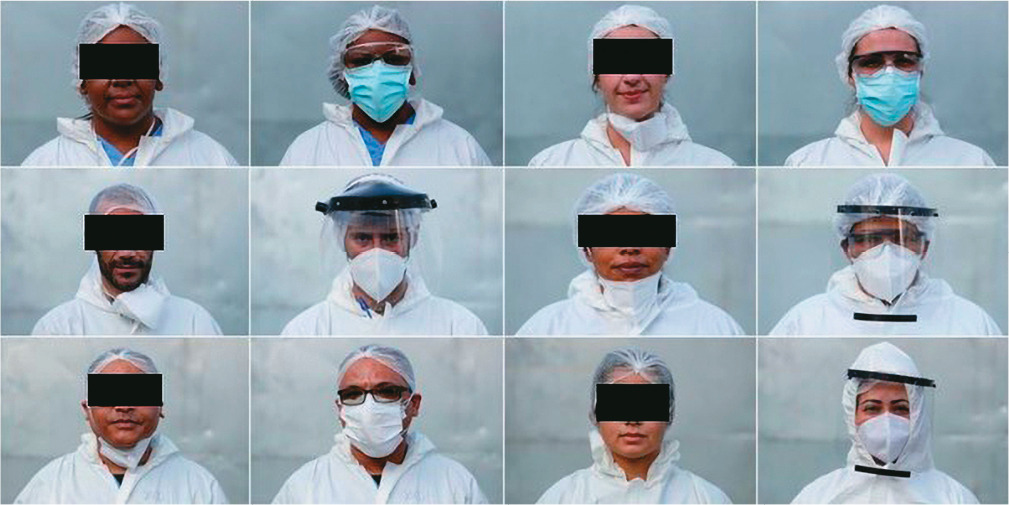
-
ORIGINAL ARTICLE09-24-2022
Nurses’ performance in palliative care: spiritual care in the light of Theory of Human Caring
Revista Brasileira de Enfermagem. 2022;75(1):e20210029
Abstract
ORIGINAL ARTICLENurses’ performance in palliative care: spiritual care in the light of Theory of Human Caring
Revista Brasileira de Enfermagem. 2022;75(1):e20210029
DOI 10.1590/0034-7167-2021-0029
Views1See moreABSTRACT
Objectives:
to analyze nurses’ role in assisting patients in palliative care, with emphasis on the spiritual dimension, in the light of Theory of Human Caring.
Methods:
this is an exploratory, qualitative study, carried out in a hospital in João Pessoa, Paraíba, between August and December 2019, with 10 nurses. For data collection, semi-structured interviews were used. For analysis, we opted for content analysis.
Results:
the spiritual dimension of care is contemplated by several religious and spiritual practices. These are respected and encouraged by nurses, although there is difficulty in providing care for the spiritual dimension.
Final Considerations:
nurses have attitudes consistent with Jean Watson’s Theory and apply the Caritas Process elements during assistance to patients’ spiritual dimension in palliative care.
-
ORIGINAL ARTICLE10-01-2022
Self-care of elderly people with diabetes mellitus and the nurse-patient interpersonal relationship
Revista Brasileira de Enfermagem. 2022;75(1):e20201257
Abstract
ORIGINAL ARTICLESelf-care of elderly people with diabetes mellitus and the nurse-patient interpersonal relationship
Revista Brasileira de Enfermagem. 2022;75(1):e20201257
DOI 10.1590/0034-7167-2020-1257
Views1INTRODUCTIONChronic non-communicable diseases are the main causes of death and health problems in the world, causing about 41 million deaths each year, which corresponds to approximately 71% of all deaths. Among these diseases, diabetes mellitus has stood out due to the increase in its incidence and prevalence().Estimates indicate that 463 million people live with diabetes […]See more -
Evolution of nursing teaching in the use of education technology: a scoping review
Revista Brasileira de Enfermagem. 2021;74:e20200422
Abstract
Evolution of nursing teaching in the use of education technology: a scoping review
Revista Brasileira de Enfermagem. 2021;74:e20200422
DOI 10.1590/0034-7167-2020-0422
Views1See moreABSTRACT
Objective:
To identify and map the technological tools of information and communication to support the teaching learning process in Nursing teaching courses.
Methods:
This is a scoping review whose search was carried out in seven databases and in grey literature. After an initial analysis of the selection, 88 texts were read integrally, and 29 made up the final sample.
Results:
Virtual learning environment and object, simulation, hypermedia, and software or cellphone applications were the tools the nursing professors used the most. Studies highlight that the application of technology was important in the teaching-learning process, since it encouraged teaching based on safe care, motivating and developing abilities/competences, supported on significant, effective, flexible, and autonomous learning.
Conclusion:
The contribution of the technology for nursing formation stands out, but it should be highlighted that its employment must be critical, reflective, based on pedagogical theories and developed by trained professors.

-
ORIGINAL ARTICLE10-19-2020
Spatial patterns of multidrug-resistant tuberculosis: correlation with sociodemographic variables and type of notification
Revista Brasileira de Enfermagem. 2020;73:e20190845
Abstract
ORIGINAL ARTICLESpatial patterns of multidrug-resistant tuberculosis: correlation with sociodemographic variables and type of notification
Revista Brasileira de Enfermagem. 2020;73:e20190845
DOI 10.1590/0034-7167-2019-0845
Views0ABSTRACT
Objective:
Correlate the cases of multidrug-resistant tuberculosis and its spatial patterns with the type of notification and sociodemographic variables.
Method:
Ecological study carried out in the municipality of Belém, with 77 cases of multidrug-resistant tuberculosis registered in the Special Treatment Information System for Tuberculosis, between 2012 and 2016. For analysis, the data was debugged followed by geo-referencing in ArcGis 10.3 and Terra View 4.2.2. To relate the cases with the type of notification, the BioEstat 5.4 software was used, with a significance level of 95%.
Results:
Of the total, 40 (52%) were new cases; 27 (35%), relapses; and ten (13%) were re-enrolled after leaving. Multidrug-resistant tuberculosis was randomly distributed and related to income, household, territorial cluster and water supply. There was a concentration of cases in two administrative districts, corresponding to 28.5% and 27.3% of the total, with a median Sociodemographic Index.
Conclusion:
Behavior of multidrug-resistant tuberculosis influenced by sociodemographic indicators.
Keywords:EpidemiologyGeographic Information SystemsMultidrug-Resistant TuberculosisPublic HealthSpatial AnalysisSee more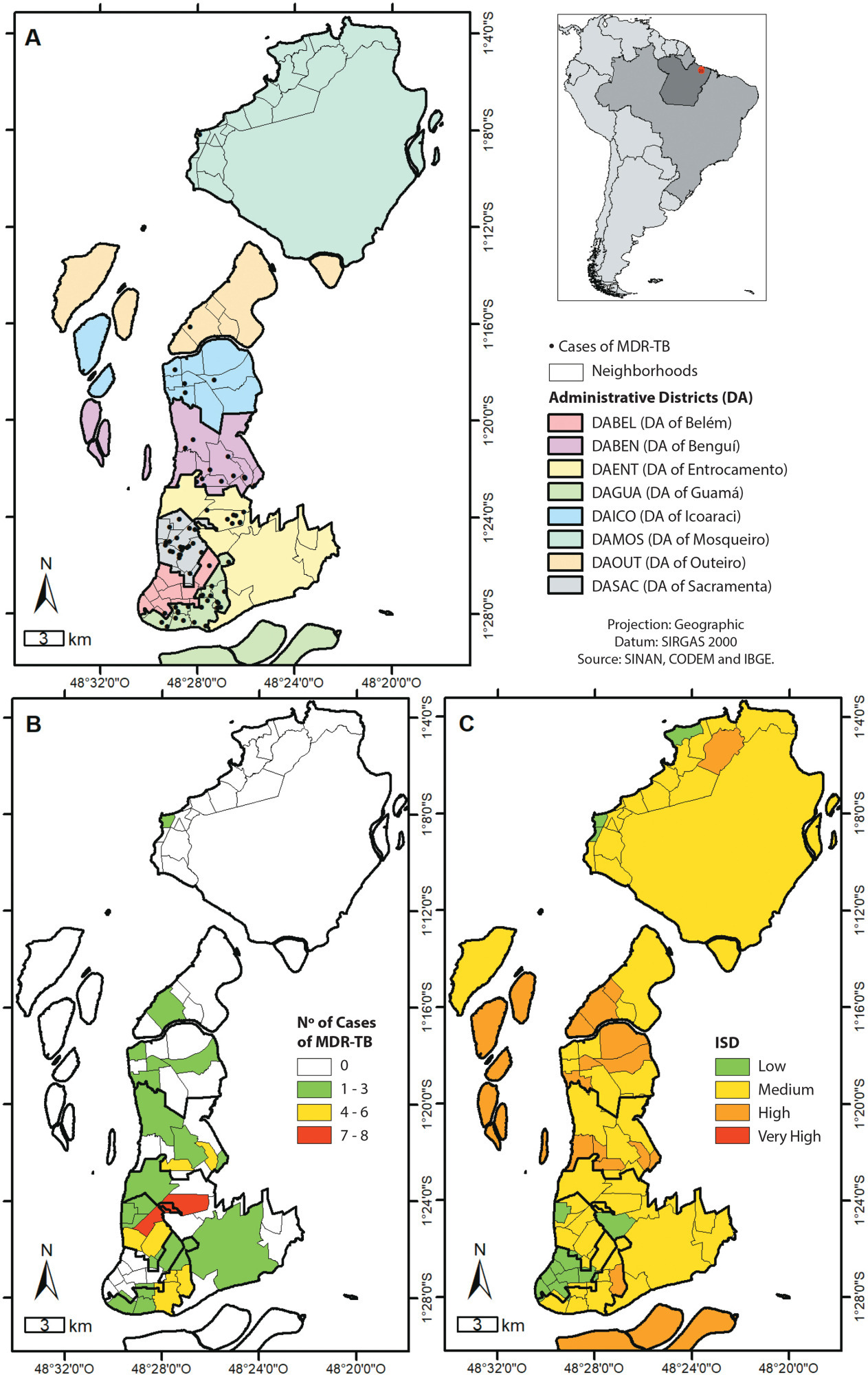
-
ORIGINAL ARTICLE09-23-2022
Analysis of the concept of cardiovascular risk: contributions to nursing practice
Revista Brasileira de Enfermagem. 2022;75(4):e20210803
Abstract
ORIGINAL ARTICLEAnalysis of the concept of cardiovascular risk: contributions to nursing practice
Revista Brasileira de Enfermagem. 2022;75(4):e20210803
DOI 10.1590/0034-7167-2021-0803
Views0See moreABSTRACT
Objectives:
to analyze the concept of cardiovascular risk to support nursing practice.
Methods:
this is an analysis to define the concept of cardiovascular risk, through the use of eight steps of Walker’s and Avant’s framework, using a literature review in indexed scientific journals.
Results:
cardiovascular risk is defined in a broad and original way as a context of health and nursing care that makes it possible to identify modifiable (cardiometabolic, behavioral, psychosocial, cultural and occupational) and non-modifiable (biological) risk factors for cardiovascular diseases that act as early and interrelated markers, of multiple and heterogeneous etiology, predisposing to cardiovascular vulnerability.
Conclusions:
with the analysis and definition of the concept of cardiovascular risk, we realized that it will be possible to base nursing practice, with implications in clinical practice for identifying and reducing risk factors for cardiovascular diseases, with nursing relevance in the care of these subjects.
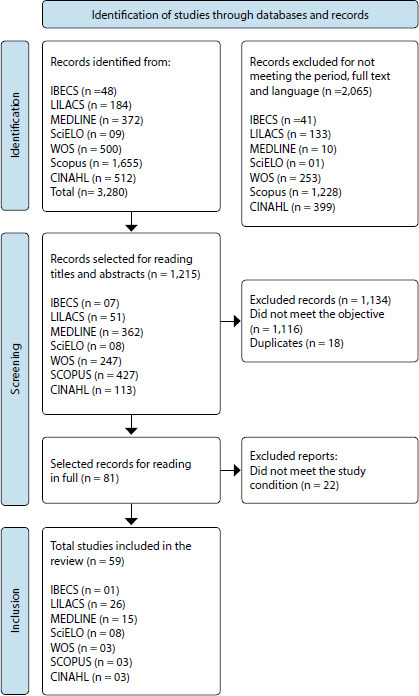
-
ORIGINAL ARTICLE07-13-2020
Awareness raising workshop for nursing students on the elderly with Alzheimer’s disease: contributions to education
Revista Brasileira de Enfermagem. 2020;73:e20190021
Abstract
ORIGINAL ARTICLEAwareness raising workshop for nursing students on the elderly with Alzheimer’s disease: contributions to education
Revista Brasileira de Enfermagem. 2020;73:e20190021
DOI 10.1590/0034-7167-2019-0021
Views0See moreABSTRACT
Objective:
To describe the contribution of an awareness-raising workshop for nursing students on Alzheimer’s disease in the context of the elderly/family.
Methods:
Strategic action-research developed with 15 university students from the sixth to the eighth semester of Nursing at a university institution in the Rio Grande do Sul. The data collected through semi-structured interviews, before and after an awareness-raising workshop on Alzheimer’s disease in elderly/family, were subjected to thematic content analysis.
Results:
Six categories were identified that concern (Mis) perception of Alzheimer’s disease in the context of elderly/ family, from the characterization; risk factors; diagnosis; treatment of Alzheimer’s disease; from care to family members/caregivers; and care strategies for the elderly with Alzheimer’s disease.
Conclusion:
The awareness-raising workshop enabled the students to broaden and deepen the knowledge on the theme of Alzheimer’s disease in the elderly.
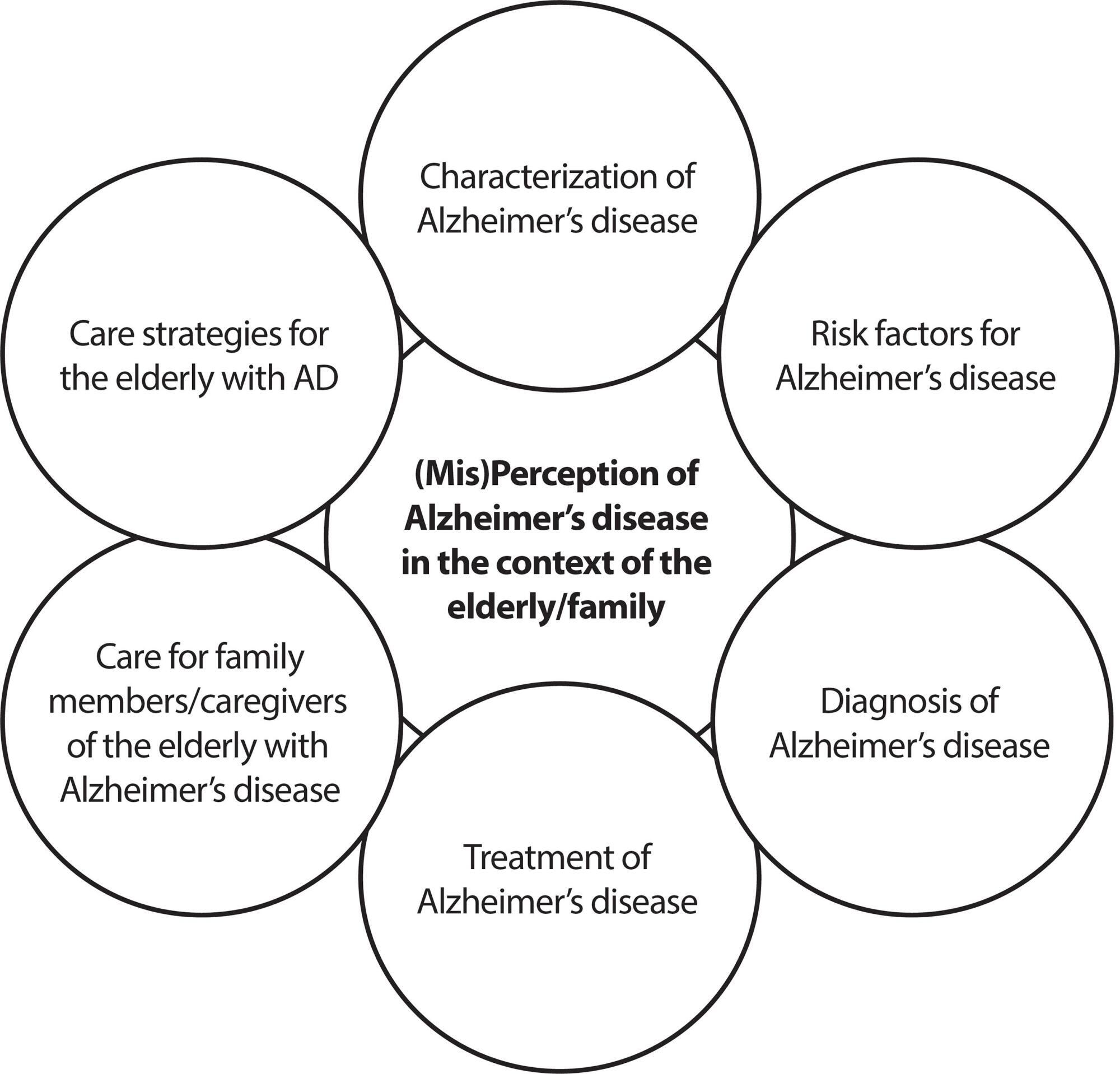
-
REFLECTION12-13-2019
Women with fetal death: nurses’ care limitations
Revista Brasileira de Enfermagem. 2019;72:365-368
Abstract
REFLECTIONWomen with fetal death: nurses’ care limitations
Revista Brasileira de Enfermagem. 2019;72:365-368
DOI 10.1590/0034-7167-2018-0261
Views0ABSTRACT
Objective:
To present the limitations of the nursing care for women with fetal death, reflecting on this challenge for care practices.
Method:
Reflective study with theoretical focus on national and international publications, along with the experience of the authors in the area of women’s health and obstetrics.
Results:
There are limitations related to nursing care, which involve feelings of insecurity and powerlessness, inappropriate attitudes of these professionals in front of women, difficulties to manage emotional aspects, and structural problems of health services.
Final Considerations:
This study points out that there are challenges to qualify nursing care for women with fetal death, which included academic studies and continuing education in health services. Relational aspects should be valued and demand more sensitivity from nurses, with more empathic relationships in the care for women with fetal death.
Keywords:Fetal DeathHealth Services Needs and DemandNurse-Patient RelationsNursing CareWomen's HealthSee more -
ORIGINAL ARTICLE02-06-2023
Teaching entrepreneurship in undergraduate Nursing course: evaluation of an educational proposal
Revista Brasileira de Enfermagem. 2023;76(2):e20210244
Abstract
ORIGINAL ARTICLETeaching entrepreneurship in undergraduate Nursing course: evaluation of an educational proposal
Revista Brasileira de Enfermagem. 2023;76(2):e20210244
DOI 10.1590/0034-7167-2021-0244
Views0See moreABSTRACT
Objective:
To evaluate a proposal for teaching entrepreneurship in an undergraduate Nursing course that uses active methodologies and activities based on the theory of meaningful learning.
Methods:
Interventional, prospective study, with a quantitative perspective, with a total of 102 participating students, carried out from July 2017 to December 2019 at a public university in the state of Sao Paulo. Statistical analysis were performed by non-parametric Chi-square or Fisher’s exact tests, with differences considered statistically significant if p < 0.05.
Results:
Improvements were observed in almost all items evaluated, revealing that meaningful learning became more effective with the use of active teaching methodologies. Most students need adaptation and effort to be put into these methods.
Conclusions:
The proposal offers pedagogical content adaptation, specifically for nursing students. New research should expand teaching-learning techniques for the development of future nurses, preparing them adequately for the job market.

-
ORIGINAL ARTICLE10-18-2022
Health education for hospitalized patient in nursing care: a conceptual analysis
Revista Brasileira de Enfermagem. 2022;75(2):e20200459
Abstract
ORIGINAL ARTICLEHealth education for hospitalized patient in nursing care: a conceptual analysis
Revista Brasileira de Enfermagem. 2022;75(2):e20200459
DOI 10.1590/0034-7167-2020-0459
Views0INTRODUCTIONOver the years, the development of health education practices is related to the historical moment of society(). The nineteenth and twentieth centuries presented decisive situations in the evolution process that we know today as health education. Nursing began to consider health educational practices after Florence Nightingale initially focused on professional training. Florence contributed to the […]See more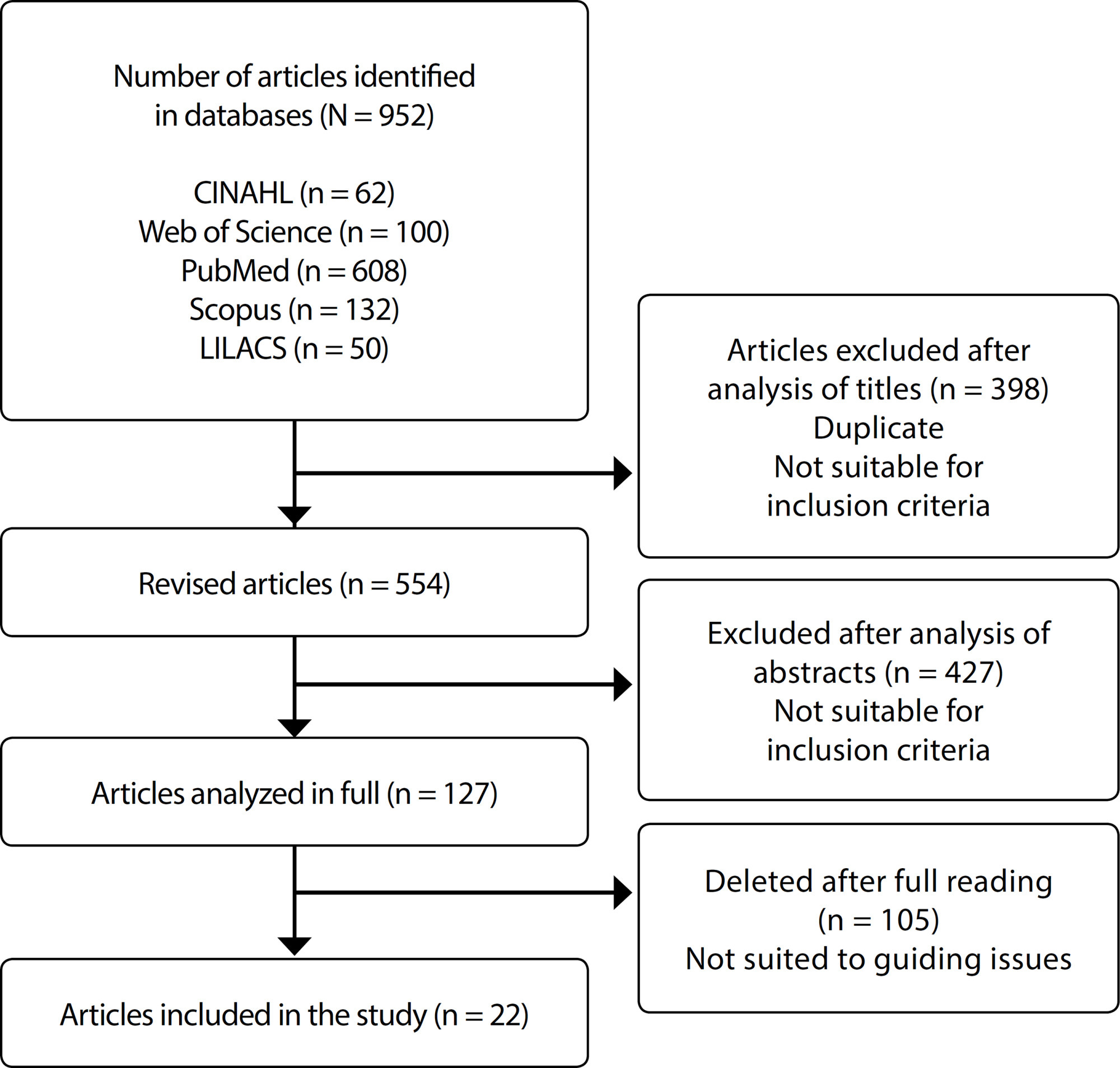
-
ORIGINAL ARTICLE06-27-2019
Organizational climate and teamwork at the Family Health Strategy
Revista Brasileira de Enfermagem. 2019;72(3):721-727
Abstract
ORIGINAL ARTICLEOrganizational climate and teamwork at the Family Health Strategy
Revista Brasileira de Enfermagem. 2019;72(3):721-727
DOI 10.1590/0034-7167-2017-0770
Views0See moreABSTRACT
Objective:
to measure the organizational climate in the work of professionals from Family Health Strategy (FHS) teams.
Method:
a cross-sectional study carried out with 458 professionals belonging to 72 FHS teams in a municipality in Southern Brazil. Data collection occurred between March and July of 2016 with self-application of the Team Climate Inventory (TCI). Data were analyzed by means of a non-parametric ANOVA.
Results:
“Team Participation” was the best-rated domain (8.11), while “Task orientation” was the worst (7.51). Nurses obtained the highest mean in TCI (8.05), and dentists, the lowest (7.45).
Conclusion:
TCI is an appropriate and innovative tool for assessing the teamwork climate at the FHS. Identifying fragilities such as “task orientation” and relationships among professional categories of the team supports the planning of actions for organizational climate improvements and teamwork at the FHS.
-
TECHNOLOGICAL INNOVATION09-24-2022
Transitional care from the hospital to the home in heart failure: implementation of best practices
Revista Brasileira de Enfermagem. 2022;75(1):e20210123
Abstract
TECHNOLOGICAL INNOVATIONTransitional care from the hospital to the home in heart failure: implementation of best practices
Revista Brasileira de Enfermagem. 2022;75(1):e20210123
DOI 10.1590/0034-7167-2021-0123
Views0See moreABSTRACT
Objectives:
Assess the compliance of the implementation of better evidence in the transitional care of the person with heart failure from the hospital to the home.
Methods:
Evidence implementation project according to the JBI methodology in a cardiology hospital in São Paulo. Six criteria were audited before and after implementing strategies to increase compliance with best practices. 14 nurses and 22 patients participated in the audits.
Results:
In the baseline audit, compliance was null with five of the six criteria. Strategies: training of nurses; reformulation of the hospital discharge form and guidance on self-care in care contexts; and making telephone contact on the 7th, 14th and 21st days after discharge. In the follow-up audit, there was 100% compliance with five of the six criteria.
Conclusion:
The project made it possible to increase the compliance of transitional care practices in people with heart failure with the recommendations based on the best evidence.

Search
Search in:
Nuvem de Tags
Aged (144) Atenção Primária à Saúde (239) COVID-19 (104) Cuidados de Enfermagem (269) Educação em Enfermagem (151) Educação em Saúde (139) Enfermagem (930) Estudos de Validação (131) Health Education (144) Idoso (208) Mental Health (149) Nursing (987) Nursing Care (306) Patient Safety (151) Primary Health Care (284) Qualidade de Vida (104) Quality of Life (106) Saúde Mental (145) Segurança do Paciente (150) Validation Studies (108)



